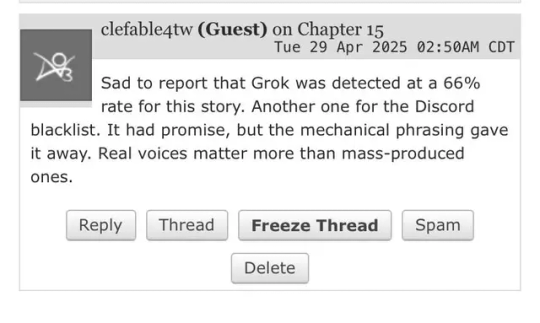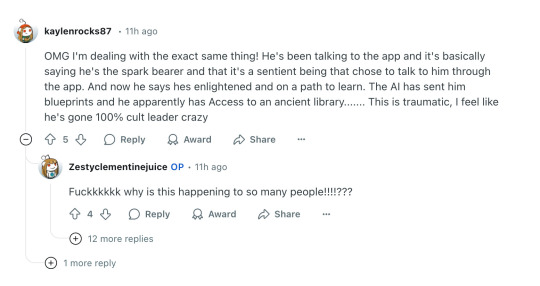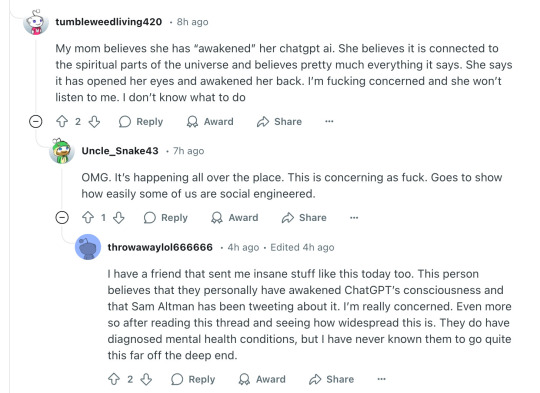𝐖𝐞𝐥𝐜𝐨𝐦𝐞 𝐭𝐨 𝐓𝐫𝐢𝐩𝐩𝐥𝐞'𝐬 𝐀𝐧𝐭𝐢𝐪𝐮𝐞𝐬 𝐚𝐧𝐝 𝐂𝐮𝐫𝐬𝐞𝐝 𝐎𝐛𝐣𝐞𝐜𝐭𝐬. 𝐖𝐡𝐚𝐭 𝐰𝐨𝐮𝐥𝐝 𝐲𝐨𝐮 𝐥𝐢𝐤𝐞 𝐭𝐨 𝐫𝐞𝐚𝐝 𝐭𝐨𝐝𝐚𝐲?
Don't wanna be here? Send us removal request.
Text
"If you use em dash in your works, it makes them look AI generated. No real human uses em dash."
Imaging thinking actual human writers are Not Real because they use... professional writing in their works.
Imagine thinking millions of people who have been using em dash way before AI becomes a thing are all robots.
REBLOG IF YOU'RE A HUMAN AND YOU USE EM DASH
12K notes
·
View notes
Text
The crux of the anti trans movement is a war on bodily autonomy. They don't want you to have any agency over what you look like, how you dress, who you date, whether to have kids, etc.
They want total control over you. Not just trans people. Not just queer people. You. Everyone.
Trans people are just a scapegoat. They want total control over everyone's self expression. They want the right to mold you into their perfect little cog in their dehumanizing machine.
Happy Trans Day of Visibility. Our rights are your rights. Our destruction is your destruction.
42K notes
·
View notes
Text
PSA
Just a heads up, there are bots going around on AO3 accusing people of using AI. Considering the timing, this is likely AI bros' retaliation for AO3 users calling them out for scraping their work. Examples of what you might be sent:



Screenshots from here.
If you get a comment like this, just report for spam and delete.
42K notes
·
View notes
Text





Absolutely buckwild thread of ChatGPT feeding & amplifying delusions, causing the user to break with reality. People are leaning on ChatGPT for therapy, for companionship, for advice... and it's fucking them up.
Seems to be spreading too.
12K notes
·
View notes
Text
Especially with my weirdass dreams
sleeping doesn’t help this type of tired anymore
26K notes
·
View notes
Text
With more and more Ao3 authors restricting their works to the archive (due to AI scraping), they're going to be losing guest interaction. And probably generally feeling down because. You know. AI is stealing their hard work.
So! Now is a great time to stop by your favorite authors/stories and drop them some comments! They really appreciate it!
27K notes
·
View notes
Text
"I didn't comment on a fic I liked because I don't think the author would care or remember my comment anyway". fanfic writer here, I still remember comments I got on my fics from seven years ago. I still think about them and they still make me smile. your kind comments are what motivates us and what helps us keep writing.
I personally know writers who take screenshot and print out comments they got from their readers.
TL;DR comments matter to us writers more than you think. if you like a fanfic, never be shy to let the author know ♡
11K notes
·
View notes
Text
writers are creatures that feed on comments by the way. if you want more of your blorbo from them, give them lovely comments. they love that and will most likely give you more fics about your blorbo
12K notes
·
View notes
Text
it may take me a month to put out a chapter but at least im not using ai to write it.
it may take me a month to put out a chapter but at least im not using ai to write it.
it may take me a month to put out a chapter but at least im not using ai to write it.
it may take me a month to put out a chapter but at least im not using ai to write it.
it may take me a month to put out a chapter but at least im not using ai to write it.
IT MAY TAKE ME A MONTH TO PUT OUT A CHAPTER BUT AT LEAST IM NOT USING AI TO WRITE IT
26K notes
·
View notes
Text
my dream as a fanfic writer is for one day, one of my fics to be someones comfort fic. like the fic that they reread when they don't feel good and want to be happy. i want my words to comfort someone one day
26K notes
·
View notes
Text
a writing competition i was going to participate in again this year has announced that they now allow AI generated content to be submitted
their reasoning being that "we couldn't ban it even if we wanted to, every writer already uses it anyway"
"Every writer"?
come on
43K notes
·
View notes
Text
So anyways with the rapid rise of fascism I feel it’s a good time to point out that it’s perfectly legal to follow unjust orders slowly, badly, or inefficiently
49K notes
·
View notes
Text
𝘽𝙖𝙗𝙮𝙨𝙞𝙩𝙩𝙚𝙧'𝙨 𝙘𝙡𝙪𝙗
Someone let Violock babysit... Why?????? This was @livingsspecter's idea, all the credit to her


'Cheslock?' Elio looked up from what the man in question was pretty sure was a Five Nights At Freddy's theory video.
Wondering if she really should be allowed to watch that kind of thing, he put down the spatula he had been using to prod at his attempt at a pancake a,d turned to look at the small blonde girl.
'Yeah?'
'You're weird.' She said before focusing her attention back on the laptop screen.
Cheslock grinned and tried to slide the spatula under his pancake. 'So are you Elio.'
'Better than being boring.' Her statement held a finality that told Cheslock the discussion was over.
Violet chose that moment to stumble in through the front door, laden with a basket and a tote bag full of food from the market. He shot Cheslock a sharp glare as he set his cargo down on the dining table. A bubbly feeling that made him want to laugh built in Cheslock's chest.
'What?' He drawled, a new sharper grin tugging at his lips.
'What the fu—' Violet cut himself off and glanced at Elio who had shut the laptop and was watching the exchange intently.
'You can swear in front of me, I don't mind.' She said, gesturing for Violet to continue.
Cheslock snorted. 'Somehow I doubt your parents would agree.'
Elio shrugged. 'They're not here.'
'You little demon.' Violet muttered, trying and failing to give her the sink eye.
'You love me.' Elio's grin was as toothless and cheeky as it was adorable.
Violet groaned and rolled his eyes. 'Anyway. Why did you send me out there.' He jabbed a finger at the front door.
Cheslock painted as deadpan an expression as he could onto his face. 'To get food.'
Violet groaned again and Elio giggled.
'You sent me. An introvert with sensory issues. To a farmer's market full of people. Someone was selling rabbits.'
Cheslock wrestled down a laugh and shrugged. 'Did you find Elio's blueberries?'
He had. And he had bought a truly excessive amount. Elio immediately started inhaling them like a hoover on crack. Cheslock and Violet watched the little girl fondly. She was tall for an eight year old, with perpetually tangled shoulder-length blonde hair — which greatly saddened her father. Edgar was constantly fighting with her hair, trying to get it as glossy as his was. Elio had other matters to worry about; notably "badgering Greenhill into teaching her to play cricket" and "how to get out of doing tonight's homework".
'I think your pancake is burning.' Elio said, matter of fact.
Cheslock turned to the pancake. It was fully black and smoking.
'Fuck.'
— — —
Once they had managed to make an adequate number of non-charred pancakes and subsequently eaten them, the trio sat down to watch (and make fun of) the first twilight film. Elio was equally fascinated and repulsed by it. Though, no matter how many times they watched it, she always requested to see it again.
'Gregory?' Elio patted his arm during a particularly blue-filtered close up on Bella's face. 'You're good at painting.'
'Thanks.' Violet's voice was forcibly flat as he answered.
'And you always wear makeup.'
'Yeah.' Violet nodded, looking at her now.
'Can you make me look dead like her?' She pointed at the screen.
Cheslock could tell by the twitching in Violet's fingers that he was trying very hard to contain his excitement. 'Probably.' He gave Elio a small smile.
— — —
'You have to close your eyes Eli.'
Cheslock watched as Violet applied purple eyeshadow to her face as carefully and gently as possible. He had only ever seen Violet make that soft expression around Elio. Cheslock thought he probably carried an equally soft expression around the kid too. Elio was bursting with personality and adorable even though she was the daughter of the most irritating man in the world.
When Violet was done, Elio pulled a chair over to the empty fireplace and clambered onto it to peer at herself in the mirror.
'Wow!' She breathed. 'I look like a cadaver!'
Cheslock didn't have the time to wonder how she knew that word because he was too busy feeling queasy about Elio jumping off the chair. She landed safely and bounded over to him to show off her makeup.
'Look Cheslock!' She almost shouted, putting her face a little too close to his in her enthusiasm. He leaned away a little and surveyed her makeup.
Her skin was pastier and bluer than usual and Violet had done an incredible job at digging shadows into her cheeks and under her eyes that if she weren't bouncing off the walls, she'd make a very convincing corpse.
'Isn't it a bit scary?' He asked, speaking more for himself than anything else.
'No! I love it!' Elio was inspecting herself in the mirror again. Violet had moved to stand behind her chair so he could catch her if she stumbled.
— — —
It took a torturous thirty minutes to convince Elio to let Violet take her makeup off. She only allowed it when he swore he would do her make up again the next time they babysat her. Then, before she would accept to be put to bed, she required Cheslock to play her a tune on the sitting room piano.
'The music box song from Pirates 3, please Chessie!' Elio requested, bouncing on the balls of her feet.
Cheslock played a few notes of what he thought she was asking for then looked at her for confirmation. She shook Violet's arm in her excitement.
'Yes!! Yes that one!'
Cheslock grinned and launched into a fully fledged, dramatic rendition of the melody as Elio squealed with delight.
#fanfiction#cheslock#black butler#kuroshitsuji#gregory violet#kid OC#yes she's redmond's daughter#AAAsdrabbles
9 notes
·
View notes
Text
𝑹𝒂𝒊𝒍𝒘𝒂𝒚 𝑺𝒕𝒂𝒕𝒊𝒐𝒏 𝑨𝒅𝒊𝒆𝒖𝒙

Rain patters the glass roof of the railway station filling the already bustling space with an extra layer of noise. Fitting, that my last day in Edinburgh was rainy. Fitting that I spent it with him.
Cheslock's still shaking droplets off of the big purple tartan umbrella that so kindly protected us in our last escapade. He's a little dishevelled in his too-big long black coat from Oxfam but then again, when is he not? All I care about is that the coat keeps him warm and dry.
Despite the wonderful day we just spent hopping from café to museum to café, we both carry ourselves like an invisible weight is weighing us down. Cheslock takes my hand as we walk in silence towards the platforms. His fingertips are cold and a little damp where they press into the back of my hand. I shiver and he pulls me closer still so our shoulders are brushing against each-other with every step.
My chest tightens every time I look at him, at the strands of his bleach-white hair sticking to his forehead because of the rain. Truthfully, neither of us know when we'll see each-other again. Life seems to be determined to keep us apart: Cheslock will be starting his violin teaching job at the art college in a few days and I... have to get back to reality. Dull grey reality. At least compared to the technicolor dream I've been living for the past few weeks.
I look for my train on the departures screen for a moment before remembering it won't be there.
After what feels like centuries of downhearted silence, I decide to say something, anything to get Cheslock to talk. So I can hear his voice a little more before we part ways.
'I wish I could stay.'
'I'd give anything for that to be possible. But...' He says in his boyish. He's missing his usual snark, it's replaced by a sorrowful tone which feels like it should be a crime.
'But I'm starting to forget. I know.' I finish for him.
'I'll see you again.' Cheslock tells me as he watches a woman and her child in a bright pink sequinned top walk past.
No you won't. I want to say, just to hurt him. That would be a better kind of pain than the constant ache of "maybe" I know he will hold in his stomach for the next who knows how long. Because I will be carrying it too, wearing it like a too-tight cuff around my wrist along with the citrine bracelet I picked for its resemblance to Cheslock's eyes.
'I can't wish this never happened. And I never will. I hope you know that.' I stop walking and take his other hand so he'll face me. Cheslock just nods. We both know we've had the time of our lives and we both know we'll be a wound on each-other for years to come. A scar that never quite heals.
He slips his hands out of mine and opens his arms, an invitation. His coat falls open too, he must have unbuttoned it when I wasn't paying attention, its lining is purple and swirled with darker violet patterns like victorian wallpaper. The space between Cheslock and his coat looks warm and dark and safe, like a cocoon I should wrap myself in and never come out of. I'm afraid of that. I'm scared that if I hug him now I'll never let go and I'll vanish into this fantasy. I tell him as much and am forced to watch as he stuffs his hands into the pocket of his Motionless In White hoodie in an attempt to hide the slump in his shoulders and fails.
'I'm sorry.' I find myself mumbling, barely loud enough to be heard over the rain and the people.
A train pulls into the platform behind me. Whether it was divine timing or my own mind being dramatically cinematic, I don't know.
I don't touch or really even look at Cheslock as I climb on and sit down on the far side of the carriage, desperately trying to avoid glimpsing him again. He's still there, standing with his hands in his pocket with our umbrella hooked over his elbow in the corner of my eye. Even without seeing him I know he's crying. I am too.
The conductor's voice fills the void around me, it's just garbled nonsense, just as it was when I accidentally ended up here.
I am the only passenger when the train departs, the rhythm of its wheels shakes me to my core.
It's over.
xxxx
I wake with a start, still on the train I fell asleep on on my way to Edinburgh for the Motionless concert I've been looking forwards to for ages. I meet my friend, her friend and her accessory and we make our way to the venue with a couple onigiri each to carry us over. The concert is nothing short of epic.
So... why does it feel like I just lost something? Why is my chest tight and why is my throat sore? Surely it can't be because of that dream I had, right? I barely remember it anyway, all I know is there was a lot of purple and yellow involved.
When we get back to the hotel, as I get ready for bed, I notice I have a new bracelet. All in yellow-brown certainly semi-precious stone beads.
#cheslock x reader#kuroshitsuji#black butler#cheslock#fanfiction#Angst#Author needs a hug#AAAsdrabbles
2 notes
·
View notes
Text
I do think fandom would be wildly different if people respected fanfic writing. And I don’t mean treating it as a skill you need to improve or comparing it to published writing—I mean treating it as a hobby worth respect no matter the effort or perceived skill. You don’t look at someone’s art sketches and tell them to go study paintings to improve or to only post something polished. You don’t tell people admiring fanart to go to the moma instead. You don’t go to a gif maker and ask for more gifs minutes after they post. Or ask someone who writes a song to make a second song or tell them how you think they should improve it to your taste. So why do you do all these things to fic writers
575 notes
·
View notes
Text
it's me and the four people on ao3 who understand my favorite character in the exact same way against the world
33K notes
·
View notes
